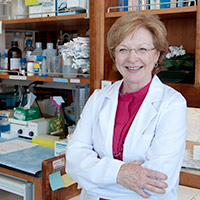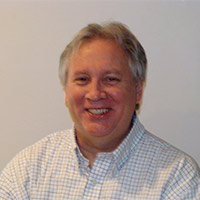Three faculty members at Washington University in St. Louis have been named fellows of the American Association for the Advancement of Science (AAAS), the world’s largest general scientific society.
The new fellows are Mary C. Dinauer, MD, PhD, David M. Holtzman, MD, and Robert G. Kranz, PhD. The rank of fellow is the highest honor awarded by AAAS in recognition of distinguished efforts to advance science or its applications.
The WUSTL faculty members are among 401 new fellows acknowledged in the Nov. 28 issue of Science magazine. The 2014 fellows will be honored Feb. 14 at the organization’s national meeting in San Jose, Calif.
Mary C. Dinauer
Dinauer, the Fred M. Saigh Distinguished Chair in Pediatric Research at St. Louis Children’s Hospital and professor of pediatrics at Washington University School of Medicine in St. Louis, is being recognized for her distinguished contributions to understanding the enzyme defect in chronic granulomatous disease — a life-threatening genetic disorder in which certain immune system cells are unable to kill some types of bacteria and fungi — and developing strategies for gene therapy to treat the disorder.

Dinauer, who is also a professor of pathology and immunology, serves as scientific director of the Children’s Discovery Institute. The institute, a partnership between St. Louis Children’s Hospital and the School of Medicine, was created in 2006 to speed discoveries in children’s medicine. As the institute’s director, Dinauer has worked to build collaborative research partnerships across many scientific departments at the university.
She earned her bachelor’s degree from Lawrence University, and her medical and doctoral degrees from the University of Chicago. She completed a residency in pediatrics at the University of California, San Francisco, where she also served as chief resident in pediatrics. Dinauer was a fellow in pediatric hematology/oncology at Harvard Medical School, Boston Children’s Hospital and the Dana-Farber Cancer Institute.
Before coming to Washington University, she was a professor of pediatrics and of microbiology/immunology and of medical and molecular genetics at Indiana University School of Medicine.
Dinauer’s many recognitions include honors from the Association of American Physicians, the American Society of Clinical Investigation and the American Academy of Pediatrics.
David M. Holtzman
Holtzman, the Andrew B. and Gretchen P. Jones Professor and head of the Department of Neurology at the School of Medicine, is being honored for distinguished contributions to understanding the pathogenesis of Alzheimer’s disease and for developing diagnostics and treatments for this disease, as well as for service to neurology and neuroscience.

Holtzman studies the causes of Alzheimer’s disease with the goal of improving diagnosis and treatment. In addition to seeing patients at the university’s Charles F. and Joanne Knight Alzheimer’s Disease Research Center and the Memory Diagnostic Center, Holtzman leads a research team working with animal models of Alzheimer’s.
His group has been instrumental in revealing mechanisms underlying the accumulation of a protein called amyloid-beta in the brain many years before Alzheimer’s symptoms arise.
More recently, Holtzman and his colleagues also have made important contributions to understanding the connections between sleep loss and Alzheimer’s risk. He is active in developing potential preventive treatments for Alzheimer’s disease, one of which is being tested in clinical trials led by Washington University.
Holtzman earned bachelor’s and medical degrees from Northwestern University. He completed an internship, residency and postdoctoral fellowship at the University of California, San Francisco, where he established the Memory and Cognitive Disorders Clinic and was assistant professor of neurology from 1991-94 before joining the School of Medicine faculty.
Past honors include the MetLife Foundation award for research on Alzheimer’s disease, a MERIT award from the National Institute on Aging of the National Institutes of Health (NIH), the Potamkin Prize for Alzheimer’s research from the American Academy of Neurology, and election to the Institute of Medicine of the National Academy of Sciences. Holtzman and colleague Randall Bateman shared the 2013 Chancellor’s Award for Innovation and Entrepreneurship at Washington University.
Robert G. Kranz
Kranz, professor of biology in Arts & Sciences, is being honored for distinguished contributions related to cytochrome c — a highly conserved protein found in unicellular organisms, plants and animals — and the pathways organisms use to assemble it.

Kranz investigates the three pathways that organisms use to assemble cytochrome c, hemeproteins that are part of the electron transport chains of mitochondria, chloroplasts and bacteria. Cytochrome c and these pathways are required for all aerobic life as well as for photosynthesis.
In 1989, Kranz’s team published research describing the discovery of genes in a new cytochrome biosynthesis pathway called System I. By the early 1990s, his group and another in Switzerland had found all of the genes in this pathway. Even though the bacterial and plant pathways are completely different from the pathway in humans, Kranz’s team has been able to engineer all three to function in Escherichia coli, which has led to detailed understanding of the pathways.
Recently, Kranz and his collaborators were the first to unravel the mechanisms behind the human cytochrome c assembly. In mammals, cytochrome c is required not only to make ATP, the energy currency of the cell, but also for programmed cell death. Defects in the genes involved in this pathway are also the basis for certain diseases.
Kranz’s lab has been funded by NIH for 27 years, as well as by the National Science Foundation, U.S. Department of Agriculture and U.S. Department of Energy. With USDA and DOE support, Kranz studied the regulation of genes that respond to environmental nitrogen and oxygen in photosynthetic bacteria during a process called nitrogen fixation.
Kranz earned a bachelor’s degree from Northern Illinois University, a doctoral degree in biochemistry from the University of Illinois at Urbana-Champaign, and completed a postdoctoral fellowship in molecular genetics at the University of Chicago. He joined Washington University in 1987 as an assistant professor in the biology department.